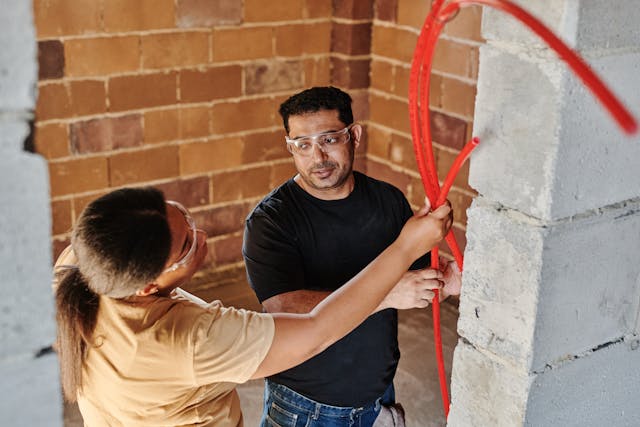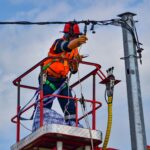Plumbing problems can be more than just an inconvenience – they can lead to costly repairs and serious damage if left unchecked. Fortunately, many common plumbing issues like clogged drains, leaks, and water damage can be prevented with proactive measures. By staying vigilant and taking a few simple steps, you can avoid plumbing disasters before they happen.
Keep Drains Clear and Flowing
Clogged drains are one of the most frequent plumbing issues, and they can cause water to back up, leading to unpleasant odours and even water damage. The key to preventing clogs is keeping your drains clear of debris. Here’s how:
- Use drain covers: Install strainers or drain covers in your sinks, showers, and tubs to catch hair, soap scum, and other debris before they go down the drain.
- Avoid pouring grease down the sink: Grease and cooking oils may seem liquid when hot, but they solidify as they cool, leading to blockages in your pipes. Instead, dispose of grease in a container and throw it away once it hardens.
- Regular maintenance: Every month, flush your drains with hot water to help clear away any build-up. For extra protection, mix baking soda with vinegar, let it sit for a few minutes, and then rinse with hot water.
By staying mindful of what goes down your drains and performing regular maintenance, you can significantly reduce the risk of clogs.

Inspect for Leaks Regularly
Leaky faucets and pipes may start small, but they can escalate into much bigger problems if ignored. Not only do leaks waste water, but they can also cause water damage, leading to mould and structural issues over time.
- Check under sinks: Periodically look for damp spots under your sinks, where slow leaks can often go unnoticed.
- Inspect visible pipes: Look at exposed pipes in your basement or utility rooms. Even a small amount of water or moisture on the outside of pipes can indicate a leak.
- Monitor your water bill: If your water usage seems abnormally high without a clear reason, it could be a sign of an undetected leak.
Addressing leaks early can save you money and prevent more extensive water damage in the long run.
Protect Your Pipes from Freezing
Cold weather can wreak havoc on your plumbing, especially if your pipes are exposed. When water freezes in your pipes, it expands, increasing the risk of bursting and flooding your home.
- Insulate exposed pipes: Wrap insulation around pipes located in unheated areas such as garages, basements, or attics.
- Allow faucets to drip: On particularly cold nights, letting a small trickle of water flow through your taps can help prevent freezing. Running water is less likely to freeze than stagnant water in the pipes.
- Keep indoor temperatures consistent: During colder months, maintain a stable indoor temperature to ensure your plumbing is protected.
Taking these precautions during winter can save you from the hassle of burst pipes and potential water damage.
Be Mindful of Water Pressure
While high water pressure might feel luxurious during a shower, it can put unnecessary strain on your plumbing system. Over time, excessive pressure can lead to leaks, worn-out fixtures, and damage to your pipes.
- Test your water pressure: Use a pressure gauge to ensure your water pressure stays between 40 and 60 psi (pounds per square inch). If your pressure is higher, consider installing a pressure-reducing valve to avoid potential issues.
- Install water-softening systems: Hard water can contribute to the build-up of mineral deposits in your pipes, reducing water flow and causing pressure to increase. A water softener can help reduce these deposits and protect your plumbing.
By managing your water pressure, you’ll prolong the life of your plumbing system and minimise the risk of leaks and burst pipes.

Know When to Call a Professional
While some plumbing tasks can be handled with DIY solutions, others require professional attention. One example of a more complex issue is a disruption in your water supply. If you find yourself wondering, “why is my cold water not running”, it’s important to seek professional assistance. Low water pressure or a lack of cold water could indicate a problem with your pipes, and a licensed plumber can diagnose and fix the issue efficiently.
Install Water Detection Devices
Early detection is the best way to prevent extensive water damage. Water detectors are small devices that can alert you when there is moisture where it shouldn’t be – whether it’s under sinks, near water heaters, or in the laundry room.
- Install near potential problem areas: Place detectors in areas prone to leaks or flooding, such as under sinks, behind toilets, or next to water heaters.
- Consider smart water detectors: Some detectors connect to your smartphone, sending you alerts even when you’re away from home, allowing you to take action before the problem escalates.
These devices provide an extra layer of protection, giving you peace of mind that you’ll be alerted if something goes wrong.
Preventing common plumbing issues requires regular maintenance and a proactive approach
By keeping your drains clear, inspecting for leaks, protecting your pipes, and monitoring water pressure, you can reduce the likelihood of costly repairs. And remember, when in doubt, calling a professional plumber can save you from more serious problems down the road. Stay vigilant, and your plumbing system will thank you!
















